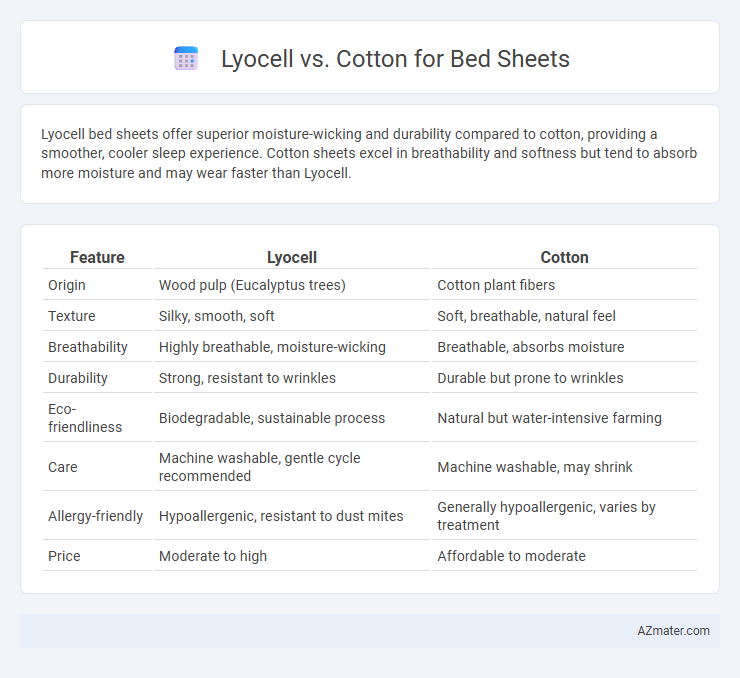Lyocell bed sheets offer superior moisture-wicking and durability compared to cotton, providing a smoother, cooler sleep experience. Cotton sheets excel in breathability and softness but tend to absorb more moisture and may wear faster than Lyocell.
Table of Comparison
| Feature | Lyocell | Cotton |
|---|---|---|
| Origin | Wood pulp (Eucalyptus trees) | Cotton plant fibers |
| Texture | Silky, smooth, soft | Soft, breathable, natural feel |
| Breathability | Highly breathable, moisture-wicking | Breathable, absorbs moisture |
| Durability | Strong, resistant to wrinkles | Durable but prone to wrinkles |
| Eco-friendliness | Biodegradable, sustainable process | Natural but water-intensive farming |
| Care | Machine washable, gentle cycle recommended | Machine washable, may shrink |
| Allergy-friendly | Hypoallergenic, resistant to dust mites | Generally hypoallergenic, varies by treatment |
| Price | Moderate to high | Affordable to moderate |
Introduction to Lyocell and Cotton Bed Sheets
Lyocell bed sheets, made from sustainably sourced wood pulp, offer exceptional moisture-wicking properties and a silky smooth texture that enhances sleep comfort. Cotton bed sheets, crafted from natural cotton fibers, provide breathability, durability, and a soft feel that improves with each wash. Choosing between Lyocell and cotton depends on preferences for eco-friendliness, moisture management, and fabric softness.
Material Origin and Production Process
Lyocell, derived from sustainably sourced eucalyptus wood pulp, undergoes a closed-loop production process where solvents are recycled, minimizing environmental impact. In contrast, cotton is a natural fiber cultivated from cotton plants with a water-intensive cultivation and chemical-dependent processing method. The eco-friendly manufacturing of Lyocell results in softer, more durable bed sheets with a lower carbon footprint compared to conventional cotton textiles.
Environmental Impact Comparison
Lyocell bed sheets have a significantly lower environmental impact compared to cotton due to their sustainable production process, which uses less water and chemicals, and employs closed-loop systems that recycle solvents. Cotton cultivation demands extensive water usage and pesticides, contributing to soil degradation and water pollution. Choosing Lyocell supports reduced carbon emissions and promotes eco-friendly textile manufacturing, making it a greener alternative for bedding.
Breathability and Temperature Regulation
Lyocell bed sheets offer superior breathability compared to cotton, allowing moisture to wick away efficiently and enhance airflow. This material maintains optimal temperature regulation by keeping sleepers cool in warm weather and warm in cooler conditions. Cotton, while breathable, can trap more heat and moisture, making Lyocell a preferred choice for those seeking a balanced and comfortable sleep environment.
Softness and Comfort Level
Lyocell bed sheets offer exceptional softness and moisture-wicking properties, making them ideal for sensitive skin and hot sleepers. Cotton sheets, especially those made from long-staple varieties like Egyptian or Pima, provide a breathable, durable, and naturally soft texture with increased comfort over time. While cotton is known for its classic feel, Lyocell blends superior smoothness with eco-friendly attributes, enhancing overall sleep quality.
Durability and Longevity
Lyocell bed sheets boast superior durability compared to cotton, thanks to their strong cellulose fibers derived from sustainably sourced wood pulp. These fibers resist pilling and maintain tensile strength even after multiple washes, ensuring longer-lasting performance. Cotton sheets, while breathable and soft, tend to wear out faster, especially lower-grade cotton, which can lead to thinning and fraying over time.
Moisture-Wicking and Hypoallergenic Properties
Lyocell bed sheets excel in moisture-wicking due to their highly absorbent fibers that draw moisture away from the skin, keeping sleepers dry and comfortable. Cotton sheets, while breathable, typically retain more moisture, which can lead to discomfort during hot nights. Both Lyocell and cotton offer hypoallergenic properties, but Lyocell's smooth fiber structure naturally resists dust mites and allergens better than conventional cotton.
Maintenance and Care Instructions
Lyocell bed sheets require gentle machine washing in cold water and low heat drying to maintain their smooth texture and prevent shrinking. Cotton bed sheets can generally withstand higher temperatures and more robust washing cycles but may shrink or wrinkle if not properly maintained. Both fabrics benefit from avoiding bleach and fabric softeners to preserve fiber integrity and enhance longevity.
Price and Value for Money
Lyocell bed sheets generally cost more than cotton due to their eco-friendly manufacturing process and superior moisture-wicking properties. Cotton sheets offer a wider price range, making them accessible for budget-conscious buyers, but may lack the durability and softness of lyocell. Considering long-term use, lyocell provides better value for money through enhanced comfort and longevity despite the higher upfront price.
Which is Best: Lyocell or Cotton for Bed Sheets?
Lyocell bed sheets offer superior moisture-wicking and breathability compared to cotton, making them ideal for hot sleepers and sensitive skin. Cotton sheets, especially Egyptian or Pima varieties, provide durability and a soft, natural feel with excellent temperature regulation. For those seeking eco-friendly and silky-smooth bedding, lyocell is best, while cotton remains the top choice for traditional comfort and long-lasting performance.

Infographic: Lyocell vs Cotton for Bed sheet
 azmater.com
azmater.com